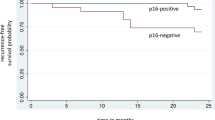Abstract
Background
This study aimed to identify prognostic clinicopathologic factors that could predict treatment failure and to analyze clinical data from p16+ oropharyngeal squamous cell carcinoma (OPSCC) patients who underwent surgery.
Methods
Data from p16+ OPSCC patients who underwent surgery at Severance Hospital of Yonsei University were retrospectively reviewed.
Results
The average smoking history was 14.6 pack-years (range 0–94 pack-years). Of the 188 patients, 73 (38.8%) underwent transoral robotic surgery (TORS) for surgical treatment of their primary lesions, and the remaining 115 patients (61.2%) underwent conventional surgery. Extracapsular nodal spread was detected in 87 patients (46.3%). At histologic examination, 67 patients (35.6%) showed positive surgical margins, and 121 patients (64.4%) had negative surgical margins. Postoperative adjuvant treatment was performed for 167 patients (88.8%). During the follow-up period, there were 18 recurrences including 2 local recurrences, 10 regional recurrences, and 6 distant metastases. During the study period, 17 deaths occurred. The univariate analysis showed that the American Joint Committee on Cancer (AJCC) 8th-edition staging system, lymphovascular invasion, more than four metastatic lymph nodes, and a smoking history of more than 10 pack-years were significantly associated with treatment failure. In the multivariate analysis, only the AJCC 8th-edition staging system was significantly associated with the patient’s survival.
Conclusion
Surgical treatment methods including TORS for p16+ OPSCC patients showed excellent oncologic results, and many previously known clinicopathologic factors did not show a significant relationship with patient prognosis. Only the newly revised AJCC 8th-edition staging system showed a significant relationship with patient survival, and this should be considered in the setting of p16+ OPSCC treatment guidelines in the future.


Similar content being viewed by others
References
Chaturvedi AK, Engels EA, Anderson WF, Gillison ML. Incidence trends for human papillomavirus-related and -unrelated oral squamous cell carcinomas in the United States. J Clin Oncol. 2008;26:612–9.
Ramqvist T, Dalianis T. Oropharyngeal cancer epidemic and human papillomavirus. Emerg Infect Dis. 2010;16:1671–7.
Sturgis EM, Ang KK. The epidemic of HPV-associated oropharyngeal cancer is here: is it time to change our treatment paradigms? J Natl Compr Canc Netw. 2011;9:665–73.
Nguyen NP, Ly BH, Betz M, Vinh-Hung V. Importance of age as a prognostic factor for tonsillar carcinoma. Ann Surg Oncol. 2010;17:2570–7.
Panwar A, Batra R, Lydiatt WM, Ganti AK. Human papilloma virus positive oropharyngeal squamous cell carcinoma: a growing epidemic. Cancer Treat Rev. 2014;40:215–9.
Smith EM, Wang D, Rubenstein LM, Morris WA, Turek LP, Haugen TH. Association between p53 and human papillomavirus in head and neck cancer survival. Cancer Epidemiol Biomark Prev. 2008;17:421–7.
Ang KK, Sturgis EM. Human papillomavirus as a marker of the natural history and response to therapy of head and neck squamous cell carcinoma. Semin Radiat Oncol. 2012;22:128–42.
Granata R, Miceli R, Orlandi E, et al. Tumor stage, human papillomavirus, and smoking status affect the survival of patients with oropharyngeal cancer: an Italian validation study. Ann Oncol. 2012;23:1832–7.
Ang KK, Harris J, Wheeler R, et al. Human papillomavirus and survival of patients with oropharyngeal cancer. N Engl J Med. 2010;363:24–35.
Rietbergen MM, Brakenhoff RH, Bloemena E, et al. Human papillomavirus detection and comorbidity: critical issues in selection of patients with oropharyngeal cancer for treatment de-escalation trials. Ann Oncol. 2013;24:2740–5.
O’Sullivan B, Huang SH, Su J, Garden AS, Sturgis EM, Dahlstrom K, et al. Development and validation of a staging system for HPV-related oropharyngeal cancer by the International Collaboration on Oropharyngeal cancer Network for Staging (ICON-S): a multicentre cohort study. Lancet Oncol. 2016;17:440–51.
Haughey BH, Sinha P, Kallogjeri D, Goldberg RL, Lewis JS Jr, Piccirillo JF, et al. Pathology-based staging for HPV-positive squamous carcinoma of the oropharynx. Oral Oncol. 2016;62:11–9.
Cohen MA, Weinstein GS, O’Malley BW Jr, Feldman M, Quon H. Transoral robotic surgery and human papillomavirus status: oncologic results. Head Neck. 2011;33:573–80.
Weinstein GS, O’Malley BW Jr, Cohen MA, Quon H. Transoral robotic surgery for advanced oropharyngeal carcinoma. Arch Otolaryngol Head Neck Surg. 2010;136:1079–85.
O’Sullivan B, Huang SH, Siu LL, et al. Deintensification candidate subgroups in human papillomavirus-related oropharyngeal cancer according to minimal risk of distant metastasis. J Clin Oncol. 2013;31:543–50.
Kaczmar JM, Tan KS, Heitjan DF, et al. HPV-related oropharyngeal cancer: risk factors for treatment failure in patients managed with primary transoral robotic surgery. Head Neck. 2016;38:59–65.
Author information
Authors and Affiliations
Corresponding author
Ethics declarations
Disclosures
There are no conflicts of interest.
Rights and permissions
About this article
Cite this article
Park, Y.M., Kang, M.S., Koh, Y.W. et al. Does p16+ Predict a Favorable Prognosis for Oropharyngeal Cancer? Risk Factors for Treatment Failure for Patients Who Underwent Surgery-Based Therapy. Ann Surg Oncol 26, 547–554 (2019). https://doi.org/10.1245/s10434-018-6806-x
Received:
Published:
Issue Date:
DOI: https://doi.org/10.1245/s10434-018-6806-x




